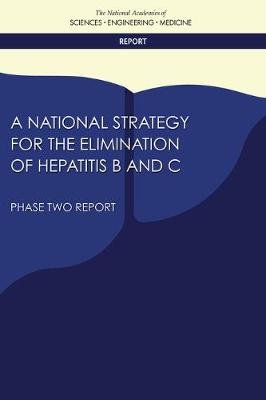
A National Strategy for the Elimination of Hepatitis B and C
Phase Two Report
Seiten
2017
National Academies Press (Verlag)
978-0-309-45729-3 (ISBN)
National Academies Press (Verlag)
978-0-309-45729-3 (ISBN)
Hepatitis B and C cause most cases of hepatitis in the United States and the world. The two diseases account for about a million deaths a year and 78 percent of world's hepatocellular carcinoma and more than half of all fatal cirrhosis. In 2013 viral hepatitis, of which hepatitis B virus (HBV) and hepatitis C virus (HCV) are the most common types, surpassed HIV and AIDS to become the seventh leading cause of death worldwide.
The world now has the tools to prevent hepatitis B and cure hepatitis C. Perfect vaccination could eradicate HBV, but it would take two generations at least. In the meantime, there is no cure for the millions of people already infected. Conversely, there is no vaccine for HCV, but new direct-acting antivirals can cure 95 percent of chronic infections, though these drugs are unlikely to reach all chronically-infected people anytime soon. This report, the second of two, builds off the conclusions of the first report and outlines a strategy for hepatitis reduction over time and specific actions to achieve them.
Table of Contents
Front Matter
Summary
1 Introduction
2 Targets for Elimination
3 Public Health Information
4 Essential Interventions
5 Service Delivery
6 Financing Elimination
7 Research
Appendix A: Population Health Impact and Cost-Effectiveness of Chronic Hepatitis B Diagnosis, Care, and Treatment in the United States
Appendix B: Modeling the Elimination of Hepatitis C in the United States
Appendix C: Public Meeting Agenda
Appendix D: Committee Biographies
The world now has the tools to prevent hepatitis B and cure hepatitis C. Perfect vaccination could eradicate HBV, but it would take two generations at least. In the meantime, there is no cure for the millions of people already infected. Conversely, there is no vaccine for HCV, but new direct-acting antivirals can cure 95 percent of chronic infections, though these drugs are unlikely to reach all chronically-infected people anytime soon. This report, the second of two, builds off the conclusions of the first report and outlines a strategy for hepatitis reduction over time and specific actions to achieve them.
Table of Contents
Front Matter
Summary
1 Introduction
2 Targets for Elimination
3 Public Health Information
4 Essential Interventions
5 Service Delivery
6 Financing Elimination
7 Research
Appendix A: Population Health Impact and Cost-Effectiveness of Chronic Hepatitis B Diagnosis, Care, and Treatment in the United States
Appendix B: Modeling the Elimination of Hepatitis C in the United States
Appendix C: Public Meeting Agenda
Appendix D: Committee Biographies
1 Front Matter; 2 Summary; 3 1 Introduction; 4 2 Targets for Elimination; 5 3 Public Health Information; 6 4 Essential Interventions; 7 5 Service Delivery; 8 6 Financing Elimination; 9 7 Research; 10 Appendix A Population Health Impact and Cost-Effectiveness of Chronic Hepatitis B Diagnosis, Care, and Treatment in the United States; 11 Appendix B Modeling the Elimination of Hepatitis C in the United States; 12 Appendix C Committee Meeting 3 Agenda; 13 Appendix D Committee Biographies
| Erscheinungsdatum | 28.09.2017 |
|---|---|
| Verlagsort | Washington |
| Sprache | englisch |
| Maße | 152 x 229 mm |
| Themenwelt | Studium ► Querschnittsbereiche ► Infektiologie / Immunologie |
| Studium ► Querschnittsbereiche ► Prävention / Gesundheitsförderung | |
| ISBN-10 | 0-309-45729-7 / 0309457297 |
| ISBN-13 | 978-0-309-45729-3 / 9780309457293 |
| Zustand | Neuware |
| Haben Sie eine Frage zum Produkt? |
Mehr entdecken
aus dem Bereich
aus dem Bereich
Buch | Softcover (2023)
Lehmanns Media (Verlag)
CHF 27,90


